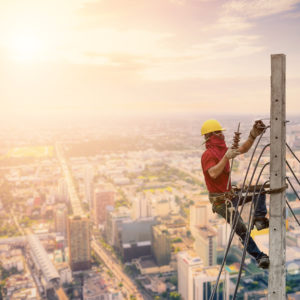As policymakers in Washington and around the country focus on infrastructure, it is critical to think about the workforce that delivers the safe, reliable, affordable and increasingly clean energy that powers our lives and our economy.
More than 74,000 lineworkers are on the front lines of delivering this energy to customers every day. Besides working on 24-hour call to respond quickly to power outages and other emergencies in a range of weather conditions, lineworkers have a physically demanding job that requires lifting, climbing poles, trenching for the installation of underground cable, and working in overhead buckets more than 50 feet off of the ground.
That is why the International Brotherhood of Electrical Workers and the Edison Electric Institute celebrate Lineworker Appreciation Day on July 10. Lineworker Appreciation Day is an opportunity to recognize lineworkers across the country for their skill and dedication.
Lineworkers manage the energy grid that powers our economy and quality of life every single day. When storms and other natural disasters hit, their jobs become even more important. In difficult and sometimes dangerous conditions, lineworkers dedicate long hours to restoring power and to helping customers and communities.
After natural disasters strike, lineworkers quickly mobilize as part of the electric power industry’s mutual assistance network. This network, which brings in out-of-state restoration crews, is a hallmark of our industry, and it is what differentiates the electric power industry from other industries. It is not uncommon for lineworkers to travel long distances to help lineworkers from other companies restore service to their customers.
For example, in the aftermath of Hurricane Matthew in 2016, lineworkers from across the country were deployed to Florida, Georgia, North Carolina, South Carolina and Virginia to help millions of customers without service. In another example from this March, Michigan experienced a historic windstorm that disrupted service to more than 1 million residents. Lineworkers worked diligently after the devastating storm, achieving the incredible feat of restoring more than 11,000 downed power lines.
Not surprisingly, this kind of work takes a great deal of training to master, and the electric power industry is creating long-term solutions to address the need for the highly skilled and diverse workforce needed to build and maintain smarter energy infrastructure.
Through its work with the Center for Energy Workforce Development (CEWD), the industry works closely with organized labor to offer on-the-job training, apprenticeship programs and continuing education opportunities. Additionally, IBEW partners with the National Electrical Contractors Association to sponsor apprenticeships nationwide through the electrical training ALLIANCE. Through this program, $180 million a year is invested in training the organized electrical construction workforce.
The electric power industry and organized labor also have a number of programs in place to boost training and employment for veterans in energy companies, since their leadership and technical skill sets align well with the needs of the industry.
The Troops to Energy Jobs program and the Utility Industry Workforce Initiative, a public-private partnership between industry and the federal government, help to accelerate the training and the employability of veterans seeking positions in energy companies. The Veterans Electrical Entry Program and Helmets to Hardhats are two additional initiatives sponsored by organized labor. Since their inception, these nonprofit programs have assisted in nearly 20,000 successful career transitions for veterans.
As we work to ensure that our workforce is increasingly diverse and has access to continuous training opportunities, we will continue to pursue beneficial partnerships among the electric power industry, CEWD, organized labor, policymakers and higher-education institutions. These efforts are critical now more than ever, as hiring in the energy industry is expected to be on the rise in the coming years.
Lineworkers play a critical role in powering our lives and improving grid security, reliability and resiliency. July 10 is a day to appreciate these dedicated men and women and all that they do to deliver the safe, reliable and increasingly clean energy that our customers want and expect. Use #ThankALineworker on your social media networks today to express gratitude for the lineworkers who work hard to keep the lights on in your community.

